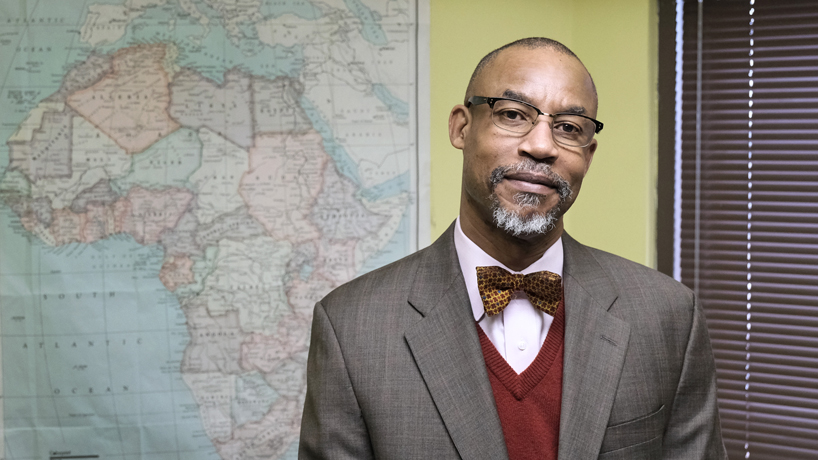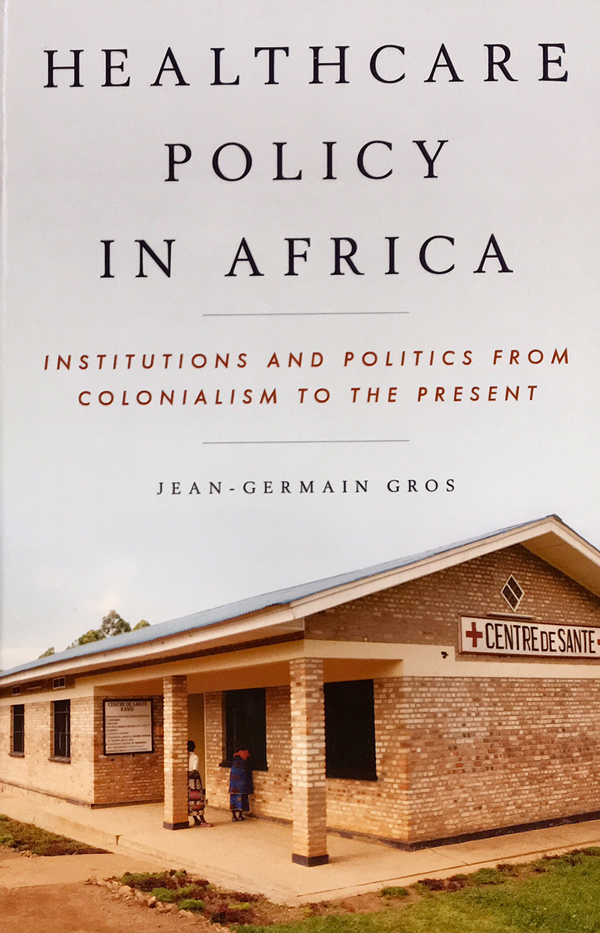
Jean-Germain Gros has earned positive reviews for his book “Healthcare Policy in Africa: Institutions and Politics from Colonialism to the Present.” (Photo by August Jennewein)
Africa continues to be beset by epidemics such as AIDS and Ebola that have attracted headlines around the globe. But its countries have lately – and with less attention – found themselves dealing with the effects of so-called rich man’s diseases such as diabetes, heart disease, high blood pressure and cancer as its citizens increasingly settle in cities and live more sedentary lives.
It all makes the continent fertile ground to research how policy is being shaped to combat these issues, particularly by developing nations constrained by limited resources.
Jean-Germain Gros, a professor of political science and public policy administration at the University of Missouri–St. Louis, digs into it all in his book “Healthcare Policy in Africa: Institutions and Politics from Colonialism to the Present.”

“Healthcare Policy in Africa: Institutions and Politics from Colonialism to the Present” was released in October 2015.
The volume has been garnering a growing amount of recognition and praise in academic circles since being published in the latter part of 2015, with Gros participating in a 90-minute podcast with host and Indiana University African Studies Librarian Mireille Djenno last month for the New Books Network.
Richard Ehui, an adjunct associate professor of history, politics and international relations at Webster University described it as “timely and worth reading” in his review in the fall issue of Journal of Retracing Africa.
“It provides critical and analytical insight into the state of Africa’s healthcare and, in particular, sheds light on the actors and institutional factors involved in making the broad decisions aimed at addressing the healthcare needs of the African people,” Ehui wrote. “Moreover, it looks into the issues that impact or impede the successful achievement of intended healthcare goals in Africa and makes some policy suggestions for better outcomes.”
Ehui is correct about the timeliness of Gros’ subject matter, but Gros traces his interest in the topic less to recent news reports than to the merging of his own experiences dating back 30 years.
It was in 1987 that Gros began working as a health-care policy analyst for the New York State Department of Social Services. It had him examining issues of Medicare and Medicaid and spurred his interest in health care.
After two years, Gros, who holds bachelor’s and master’s degrees from the State University of New York at Binghamton, decided to return to school to pursue a PhD at the University of California, Berkeley, where he specialized in African politics and comparative politics but also public administration and public policy and wrote a dissertation about veterinary health care in Africa.
If the idea to more closely examine African health-care policy has been percolating in Gros’ mind all that time, he did not make doing so a primary focus of his work until 2012 after finishing his last book, “State Failure, Underdevelopment and Foreign Intervention in Haiti.”
“As I mention in the book, we do know a relatively great deal about African politics, but we don’t know how African government actually makes policy,” he said. “Indeed, we know much less about health-care policy processes, so this is an area in which I thought I could make a contribution.”
He made multiple trips to Africa to conduct field research over a three-year period, notably spending time in Ghana, Botswana and Rwanda collecting data for comparative case studies that comprise the book’s sixth chapter.
Gros consciously chose those three nations because they have all made a commitment to universal health care while covering a range of economic profiles emblematic of other African countries, from a middle-income nation such as Botswana to an impoverished one such as Rwanda, with Ghana falling somewhere in between.
“I was also interested in regimes, the idea being you might expect democratic regimes to address health care in a certain way and nondemocratic regimes in another way,” Gros said. “So I wanted to look at countries that spanned the gamut of democratic regimes. Botswana has been basically democratic throughout its existence. Rwanda is not, and Ghana basically experienced authoritarianism and then is now fully democratic. So I thought that these three countries covered that.”
They also serve to represent different geographic areas of sub-Saharan Africa with Ghana lying along the continent’s western coastline, Rwanda in the east near the African Great Lakes and Botswana in the south.
Before delving into the case studies, Gros looks at health-care policy in Africa from a historical perspective, beginning before the continent was colonized in the 19th Century.
“You find in the literature a kind of hidden assumption that before colonialism Africans had evolved no health-care systems, and I wanted to demonstrate that is not the case,” Gros said. “In fact, what you find in places like Ghana is that colonial officials would adopt some of the public health measures that predated colonialism.
“In northern Ghana, among the Ashanti, the Asantehene – who was the king of the Ashanti – mandated that people essentially poured boiled water down their latrines every once in a while. That was an acknowledgment that feces carried with them microbes, so therefore if you poured boiled water, you could kill those microbes, thus reducing the threat of disease.”
But Gros’ book spends even more time examining the way biomedicine, introduced by imperialist forces from Europe, came to be adopted throughout the continent and remained even after the conquering forces left.
Because of Africa’s dependent position in the international political economy and state system, external forces, including multilateral institutions like the World Health Organization and the World Bank, wield a tremendous amount of influence on health-care policy choices in Africa. International nongovernmental organizations, such as the Bill and Melinda Gates Foundation, Doctors Without Borders and Partners in Health, shape health-care policy as well, even implementing it.
But Gros points out that the influence of external actors on health-care policy processes in Africa is not always nefarious, nor are African policymakers completely at the mercy of these actors.
Gros closes his work by looking forward and offering some solutions to improving policy in Africa in the 21st century and, in particular, discusses Cuban involvement in Africa.
“Cuba shows that poverty is not destiny, as I put it in the book,” Gros said. “It shows that even poor countries can make significant progress in their health-care systems if they allocate scarce resources properly.”














